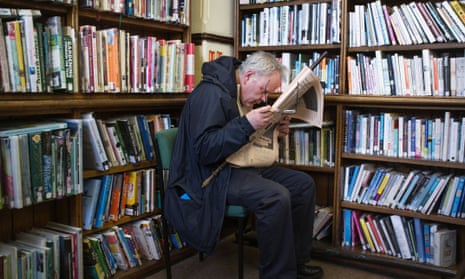“It must be great to have a job where you get to read books all day” – a statement any public librarian will have heard many times. If only. I’ve worked in public libraries for more than 10 years and I’ve driven a 7.5-tonne library bus, taught IT skills, run reading groups, arranged talks by famous authors, booked festivals and cleaned up the vomit of the homeless woman who took up residence in between the gardening and cookery books one summer.
But I’ve never spent the day reading new books and breathing in that new book smell.
As the traditional industries in the north-east dwindle, many people turn to the library when they find themselves having to fill in job applications online. It isn’t easy for those who’ve never had to go near a computer to be told to fill in applications online, or attach a CV and scanned copies of qualifications certificates to an email.
I helped a man recently who looked at the computer as if it were alien and picked up the mouse and pointed it at the screen, as you would do a remote control at the TV. He’d come to the library because it was somewhere he could access the internet for free and get help from staff who reassured him that he wasn’t the first person to do that and he wouldn’t be the last. I told him about the basic computer classes we hold in the library, that they are free and not to worry as everyone would be at the same level as him. That it might even be me running them. Our staffing isn’t what it used to be: I do a whole range of things now.
We have a job club too – an informal gathering of people searching for work who can use the computers and get help if they are struggling to write a CV or fill in a form. Since the introduction of universal credit we’ve made sure staff know how to support customers navigating the new claim system.
And then there’s the rhyme time sessions we run for babies. They used to be once a week, but now there are five with fewer staff. I’m not sure we really can do more with less, as public services are so often told to do, but we are trying to do what our customers want and we’re finding that parents and carers need free activities. Not only are these sessions important for the language development of babies and toddlers, but they offer so much to parents: they are sociable, non-judgemental activities that can help prevent isolation.
Enter any library during school holidays and you’ll find groups of young people who will most likely be using the free Wi-Fi or the computers. The library is somewhere they can go and meet friends; there aren’t many youth services left in the area. One day they might pick up a book, but it doesn’t matter if they don’t. We don’t mind.
I know many people think we don’t need libraries when there’s Amazon, kids can use Google for their homework, and supermarkets sell paperpacks for £3 and are open 24 hours. But libraries are so much more than books. They have ebooks, audio books, academic journals, online resources, online driving tests, genealogy research. They play host to art classes, carpet bowls, tea dances, cafes, dementia support sessions. They provide a space for carers to meet, and people to be part of a community when they may otherwise be socially isolated. I’ve lost count of the number of customers who have told me, “You are the only person I have spoken to all day.”
This week I attended training on the new computing curriculum. Over six hours I was shown how to use applications to do basic computer coding. We have to keep up-to-date with the curriculum and current trends: people expect librarians to have the answers and be experts in everything.
As budgets are cut libraries are being more creative in the way their services are being delivered. But there are daily news reports of libraries closing, losing staff or being run by volunteers. Who will want to become a librarian now? It’s sad because in what other profession can you be a teacher, a care worker, an artist, a children’s entertainer, an IT expert, an HGV driver and a coder all in one day? I never meant to be a librarian, but even in difficult times, when I don’t know if I’ll have a job from one round of cuts to the next, I love it.
This series aims to give a voice to the staff behind the public services that are hit by mounting cuts and rising demand, and so often denigrated by the press, politicians and public. If you would like to write an article for the series, contact tamsin.rutter@theguardian.com.
Talk to us on Twitter via @Guardianpublic and sign up for your free weekly Guardian Public Leaders newsletter with news and analysis sent direct to you every Thursday.
